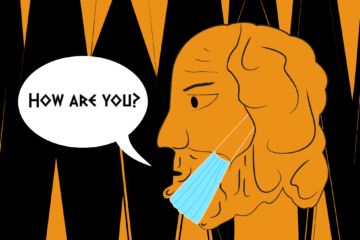[Oriġinaljament miktuba bil-Malti]
Just last Monday, in Malta we witnessed the Minister for arts and culture having a slip of the tongue. When asked about the lack of measures in place to help artists during the pandemic, his reply was that the artist does not have a “business-oriented” IQ and that art is simply a vocation. The answer can be surmised as saying that ‘artists are not so important, because they do not significantly contribute to the economy’. In other words, what constitutes importance for the state is economic contribution.
The artistic community reacted angrily, at what seemed to relegate their passions and identity as mere hobbies. But in this reaction, I can’t help but notice a self-defeating position. It could have condemned the Minister’s GDP-obsessed approach and provide an alternative vision by which the social contribution of art becomes self-evident.
Unfortunately, the reaction was quite the opposite, as it turned into a cry desperately seeking to prove that the Minister failed to see their business potential. The Minister’s comment struck a cord in the artists’ stereotypical insecurity: making a living.
Instead of responding with the call that arts and cultures are not market goods, the defensive reaction was that there are many people employed in the arts, “creative entrepreneurs who have built the industry”, and that there is evidence of “the positive contribution of the creative sectors to Malta’s economy, surpassing other sectors”.
In short, they screamed ‘we are commodities equal to the rest of the professions!’.
When Mona Lisa refused interpellation
From personal experience, I am regularly asked what it is that I am meant to do in the future with a philosophy degree. Of course, what I am actually being asked is ‘What job will you have and how much will you earn?’. Yet my answer is simply, ‘I will do philosophy’. The effect of the response, the refusal to answer the implied question, is that it denies a consumerist ideology the privilege of determining what should be obvious.
Since we are all constantly worrying about our career and salary. So much that they establish our identity, as opposed to hobbies which are secondary. In fact, when you run into an old friend whose question is usually ‘what are you up to?’, an answer about a mere ‘hobby’ somehow does not cut it.
So, when confronted with the question ‘what will you do?’, you are well-aware of the deeper significance of that question. By refusing to acknowledge the implicit statement, you would also be refusing to affirm the values of that ideology as some transcendental given. In other words, if the other person really wants to ask about plans on material subsistence (which is a valid question in itself) then they can ask the question directly.
What marks the power of an ideology (in our case, a market-driven one) is that implicit statements receive direct explicit reactions. We can all see it even if it is not there. We all know it is obviously present. Just like it used to be God, now it is the market value.
This turning down of the question therefore changes the entire meaning of the conversation. It is not a pretence of ignorance or misunderstanding. On the contrary, the one returning the dry answer hopes that the one asking knows very well that the implicit question was understood and consciously refuted.
At this point, the one asking the question should realise the absurdity of their question, and how dependent it is on the hegemonic status quo. Think of a tourist visiting the Louvre, who looks at the Mona Lisa and asks her ‘what is your value?’. Her trademark smirk is the stark refusal to answer in terms of any currency – the implicit answer to an implicit question: ‘You are looking at me. This is my value’.
Art does not grow on trees, but food does
Setting aside the romantic idea of a Bohemian artist, one has to admit that creative arts nowadays incur a lot of technical costs, which expenses must be recovered in one way or another. Not to mention that the individuals producing the art have, at the very least, the most basic material needs.
So, artists are not detached from the economic realities. However, any argument on why the sector should receive financial support should be placed on its intrinsic value rather than its economic contribution. Artists have to prove themselves by their art, not their commercial value.
The Culture Minister’s slip obviously demonstrated his lack of appreciation for art, particularly the reference to ‘IQ’ which in no context can have a neutral value in this day and age. However, in his words, there was also an element that awards some form of authenticity to art and culture, an authenticity that the artists themselves rejected. The message was that art does not occupy the realm of business and should not be the objects of commodification (and for which reason the business-oriented state does not care about them).
In this sense, the artists’ reaction should have confronted – rather than succumb to – the capital-centric position of the Minister, whose job is to safeguard the essential role that art plays in society. With his comments, the minister did not belittle artists but actually himself. He relegated his ministry to a tiny department in the ministry of finance. By pointing this out, the artists would have made explicit his being unsuitable for the public role he is supposed to serve.
But the artists failed to do so. By protesting that their economic contribution is being overlooked, they instead relegated themselves, as an industry whose social-impact is to be measured in numbers. They proved that they remain interpellated within the ideology of consumption and capital generation. Paradoxically, they thus proved the Minister to be – if not factually – in principle correct: ‘let’s weigh art by gain’.
I can’t but see the irony in the observation that the social segment built on creativity and ingenuity, remained so uncreatively and unreflectively committed to the ruling ideology and its status quo. Therefore, I demand a resignation, not from the Minister, but from those who occupy the position of artists.



0 Comments